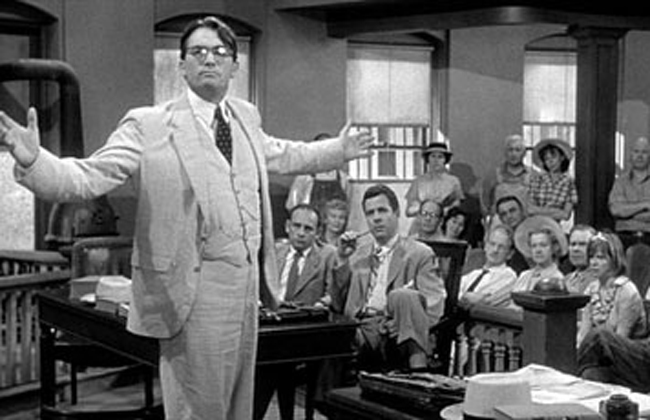
In the five-act play that’s been the odyssey of To Kill a Mockingbird in Flagler County this fall, the story is moving decisively toward its fifth and brightest act: the actual staging of the play over four performances on Feb. 24-26, in celebration of Black History–and Flagler County Redemption–Month.
Flagler Palm Coast High School Principal Jacob Oliva and Drama Director Ed Koczergo finalized those plans in a late-morning meeting today (Dec. 3), with more details to be worked out over the next few weeks, including panel discussions following the performances. Rehearsals for the play, which had gone on for three weeks before it was stopped on Oct. 21, will resume after the Christmas break.
Click On:
- Tale of Two Recommendations: Valentine “Completely” Supports Staging of Mockingbird
- In Her Own Words, Please: A Friend of Harper Lee’s Pleads the Case Against Censors
- National Coalition Against Censorship Urges Valentine To Reverse Mockingbird Decision
- Mockingbird Appeals Committee’s Challenge: Loyalty to “Protocol” vs. Free Expression
- Shapiro: In the End, It’s the Profanity of Censorship Against the Sacredness of Learning
- Conklin Triggers Mockingbird Appeals Committee, Likely Enabling Play’s Revival
- Before School Censors: When Mockingbird’s Harper Lee Spoke Proudly of Flagler County
- Citing Vague Fears, School District Suppresses Stage Production of To Kill a Mockingbird
“We’ve been meeting for the last couple of weeks on some of this stuff that we had concerns about and how we could alleviate concerns,” Oliva said, referring to Koczergo and others. “He’s been brainstorming ideas and we’ve been brainstorming ideas, and we’re working together to make everything—our goal is to put on a strong educational performance for our students and the community, and we’re going to be able to do that in February.”
Act one in the odyssey was the Drama Club’s decision to stage the play in mid-November. Act two was the school and the district’s cancellation of the play over fears that the school or the community weren’t prepared to deal with the use of the word nigger on stage. The word is used some 23 times as Harper Lee’s story, set in a small Depression-era southern Alabama town, unveils through the eyes of a young girl the small minds and bigotries of whites unjustly accusing a black man of rape. Act three was the backlash over the decision to cancel.
True to Greek tragedy’s form, the third act was also the most conflict-ridden as a public outcry, including from some of Harper Lee’s friends, led all the way to New York City, where the National Coalition Against Censorship and the Dramatists Guild of America–with a membership including the nation’s leading playwrights–intervened to urge Janet Valentine, the school superintendent, to reinstate the play. Colleen Conklin, the only school board member to take a stand on the issue beyond words, personally filed an appeal of the decision to cancel, resulting in the appeals committee — after some fuzziness — declaring the play fine and fit for staging by high school students.

Act four is ongoing: it’s rehearsals, on and off stage, for resuming and staging the play, with more preparation. Act five will be the play itself.
“Obviously I’m very happy about it,” Eddie Green, the FPC senior who’ll play Atticus Finch–the lawyer and father of the narrator, played by Gregory Peck in the 1962 movie of the 1960 novel–though Green was worried that by then the hype will have died down and smaller crowds will turn out. “Even though it was bad controversy, it still got the public’s attention, so it was going to bring in a big crowd. But I am happy. I just want rehearsals to start soon.”

The witness stand itself won’t be on stage but a few rows into the audience, with the witness being interrogated always facing the audience. At various points during the play, images of the Jim Crow and civil rights era will be projected on a screen–Rosa Parks, Martin Luther King, segregated water fountains, and so on.
By then any notion of the word nigger having more than contextual, dramatic connotations will almost certainly have been dispensed with (except in the very smallest minds). For all that, any literature, advertising or promotional material about the play will include disclaimers. And there will be panel discussions following the performances, though those details–who exactly will be on the panels, and whether they will follow every performance–have not been nailed down, except for one certainty: Jim Guines, the former school board member, will lead the panels. Oliva said he is one of the options. Other possibilities include Jack Cowardin, a novelist and correspondent of Lee’s who urged the return of the play, and Delphine Williamson, who’s been teaching the novel at FPC for two decades.
Koczergo, whose fate was in doubt during the second and third act of this story, will be directing the play. He’s been tasked with preparing a news release by Monday laying out the plan and, in Oliva’s words, “to alleviate all concerns.”
“We’re going to put on a great production,” Oliva said. “That’s going to happen. We have lots of great ideas.”






























Laura says
The kids & I will read my old red, tattered copy, (circa 1974)
and then gladly buy our tickets for the performance
in Flagler County.
Our county.
On with the show!
{{* *}}
Kim says
Please, can we not talk about To Kill A Mockingbird anymore…please.
Donna De Poalo says
Excellent news!
kmedley says
This is wonderful news. Power to the people! Just received this DVD from Netflix. Looking forward to sharing this classic with my son.
Erickson says
4 tickets please! It is not healthy for our students, community or world to have censorship.
Knowledge is power!
JIM GUINES says
I am watching all of this from afar and I am happy over the fact that the play is going to happen I am very sure that with the plans that have been discussed above will make this a “not to miss” event,